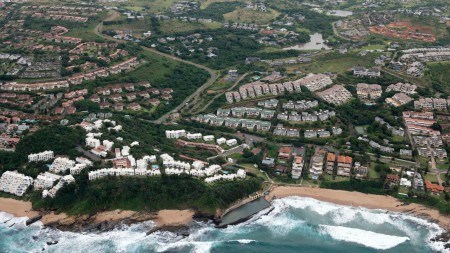Notwithstanding the fact that South Africa’s economy is technically in a recession (defined as two consecutive quarters of negative quarter-on-quarter growth), in addition to an unfortunate combination of factors (including the potential threat of a global trade war, a weakening Rand, rising oil prices and unlikelihood of further local interest rate cuts), which have further muted optimistic sentiment, the housing market surprisingly has some bright sparks, says Dr Andrew Golding, chief executive for the Pam Golding Property group.
“Economic growth is likely to continue to be sluggish for the balance of 2018 and although forecasts are for slightly stronger growth in 2019, this will take time to play itself out into the property market. Generally speaking, this suggests that the local property market will continue to be tepid but with some areas of outperformance and excellence.”
Positive underlying factors
Dr Golding says it appears likely that, as shown historically, the housing market continues to show resilience as there are still a number of positive foundations – such as the younger demographic eager to buy property and a financial sector with an appetite to extend mortgages.
“With a younger generation eager to enter the property market and an up-and-coming segment of the market which has newfound wealth and a desire to invest in real estate, we hope to see a gradually improving housing market. With household finances under pressure and a young population, we have already seen the lower end of the housing market experience an uptick, particularly as the average price for first-time buyers is estimated by ooba at R939 000.
“Furthermore, there will still be areas that continue to outperform - areas that are fulfilling a particular demand. Examples which come to mind are suburbs which offer an alternative to congestion, a flourishing business hub and easy access to good schools, for example Claremont in Cape Town or Durban North and uMhlanga in KwaZulu-Natal. Or areas which offer access to good schools and work, but better value-for-money property such as Cape Town’s Northern Suburbs and green mixed-use developments such as Menlyn Main in Pretoria.”
Location is more important than ever
Dr Golding says overall the housing market is likely to remain subdued against the current economic and political backdrop – but certain nodes, as illustrated above, will continue to flourish because they offer a particular set of circumstances for which there is ongoing demand.
For buyers and investors, choice of location is now more important than ever, as is the type of accommodation to meet the market demand. Also pricing your home to sell is more important – in a weak market it is critical to price correctly if you want to sell.
“While consumer confidence has been dented as household finances have had to adjust to reduced disposable income, interest rates are relatively low and banks remain competitive and continue to show an appetite for lending, so any setback is likely to prove temporary,” says Dr Golding.
House price inflation
National house price inflation has softened gradually during the first half of 2018, with prices increasing by an average 4.3% during this period. However, once adjusted for inflation (real prices), house prices at a national level remain unchanged from the same period a year ago. Interestingly, coastal properties (within 500m of the coastline) continue to outperform, with prices rising at almost double the pace of non-coastal properties.
At a regional level, house price inflation is diverging noticeably and after several years of outperformance, house price inflation in the Western Cape is now slowing – although still outperforming the rest of the market. This is not surprising given the fact that the Western Cape market ran well ahead of the prevailing subdued economic realities – fuelled in part by a strong semigration trend, so a natural correction was anticipated.
Adds Dr Golding: “Certainly, the drought also impacted on the housing market and this is currently coupled with the fact that winter seasonal demand is traditionally slower in the Western Cape, but we believe these are temporary concerns.
Gauteng and KZN house prices rebound
In contrast, after slowing in recent years, growth in house prices in both Gauteng and KwaZulu-Natal has been rebounding gradually since mid-2017, with the East Rand showing the strongest rebound of the three Gauteng metro areas.
Pam Golding Properties’ offices in both the Durban and burgeoning North Coast regions of KwaZulu-Natal and the Eastern Cape coastal regions, as well as areas on the Garden Route – in particular George, are upbeat regarding market activity. With appealing climates, these regions are also benefiting from home buyers relocating from upcountry and from a growing retirement market.
FNB’s estate agent survey shows that Gauteng housing market remains the strong point in South Africa in terms of realistic prices and stability. Homes in Pretoria sell in just over 11 weeks – the fastest of all metros
and considerably faster than the national average of around 16 weeks.
Notably, Pretoria is the fastest growing SA metro economy. According to the Global Metro Monitor, it now ranks 35th on a list of 300 of the world’s biggest metro areas. Pretoria has overtaken both Johannesburg and Cape Town with a 7.6% growth in employment and strong GDP per capital growth.
Says Bradd Bendall, general manager, real estate operations for Pam Golding Properties: “It is encouraging to see that the housing market in Gauteng is showing signs of recovery, particularly in the north and in Pretoria. Activity in the northern suburbs is slowly strengthening. After years of subdued / below par growth, property is more affordable and the market is balanced – laying the foundation for a recovery when the economy finally turns.
“In the Johannesburg and Pretoria metros we are seeing an upward trend in sales across all price bands and even experiencing stock shortages in high demand areas. It is likely that the appeal these areas hold for first-time buyers, namely affordability and the development of mixed-use properties, is ideally suited to the lifestyle of young professionals.”
Ever-rising demand for sectional title
As is the case nationally, Gauteng is experiencing an increasing demand for sectional title apartments - with reduced utilities costs and conveniently located for easy commutes to avoid traffic congestion and combat rising fuel costs, or in mixed-use developments which provide numerous amenities.
This is particularly so in Johannesburg, which attracts at least half of all first-time buyers and which has dealt with security and congestion for much longer than Cape Town – thus prompting the move to secure living and greater densification, closer to work and public transport nodes.
Gauteng hotspots offering good value for money
Adds Bendall: “Right now there are a number of suburbs considered hotspots as they offer good value for money – including for investment purposes. These include areas in and around Sandton, Morningside, The Parks (comprising Parkwood, Parkview, Parkhurst and Parktown North), and for top-end homes, Westcliff and Bryanston.
“Locations such as Northriding and the greater Fourways area continue to be sought after as they are very affordable, in close proximity to major roads and highways and with numerous amenities on hand such as shopping centres, excellent schools and hospitals. In both these two latter locations, it is still possible to acquire property priced from R700 000 for sectional title apartments and from R1.8 million and R2 million for freestanding homes – including cluster homes.”
As the economic powerhouse of South Africa, Gauteng is also a region which attracts many international business executives who may reside in the country on secondment for several years at a time, as well as buyers from the rest of the continent. This trend is especially evident in areas such as Fourways, Sandton, Sandhurst, Hyde Park and Houghton, and in brand new residential estates and developments in Dainfern Estate in Fourways and nearby Blair Atholl, and suburbs like Illovo, Inanda and Kelvin which are close to Sandton CBD and OR Tambo International Airport, as well as in Pretoria, such as The Regency.
In Fourways, Dainfern Square Luxury Apartments at the leading edge of Johannesburg’s ongoing expansion into the ‘new North’ is set to become one of the most desirable addresses in the city, with apartments priced from R1.75 million to R3.85 million, ideal for investment, permanent residence or partial use.
Developments that are the most popular are those with a unique appeal, for example, Sandton Skye has the benefit of hotel-like living, and this is the second tower in an already proven development. Park Central - currently under construction and set to become the tallest building in Rosebank - offers ground breaking architectural design which will make it the most iconic residential building in Johannesburg.
In Hyde Park’s ‘One97’, some apartments are offering a guaranteed rental return of 9%, so these are sought after by investors. Capital on Park in Sandton also offers a guaranteed rental return on some units, plus buyers have access to all the hotel amenities, while One on Whitely in Melrose Arch enables buyers to enjoy the live, work and play lifestyle of Melrose Arch precinct, which is in demand from both investors and buy-to-live purchasers alike.
Rejuvenation in Hillbrow
Says Sandra Gordon, Pam Golding Properties senior research analyst: “Worth noting is that we are seeing construction of the first new residential block to be built in Hillbrow since the late 1980s with a 10-storey, 128-unit apartment block going up at an investment of some R40 million.
“This is no flash in the pan as savvy developers have been investing consistently in Johannesburg inner-city, refurbishing buildings and establishing neighbourhood improvement districts for several years. When the economy rebounds, creating a modest income boost for workers, then this area is likely to be Joburg’s next developmental frontier for investors and city planners.
Smart eco-city
“We’ve already seen the success of Menlyn Maine, now construction has begun on Sandton Gate – a new R3 billion smart eco-city. The first phase will see the construction of over 30 000sqm of mixed-use space, including premium-grade office space, a residential block and amenities like a gym. The Sandton Gate precinct is envisioned as an eco-friendly smart mini-city that will serve as a commercial and residential hub within the greater Sandton area.”




